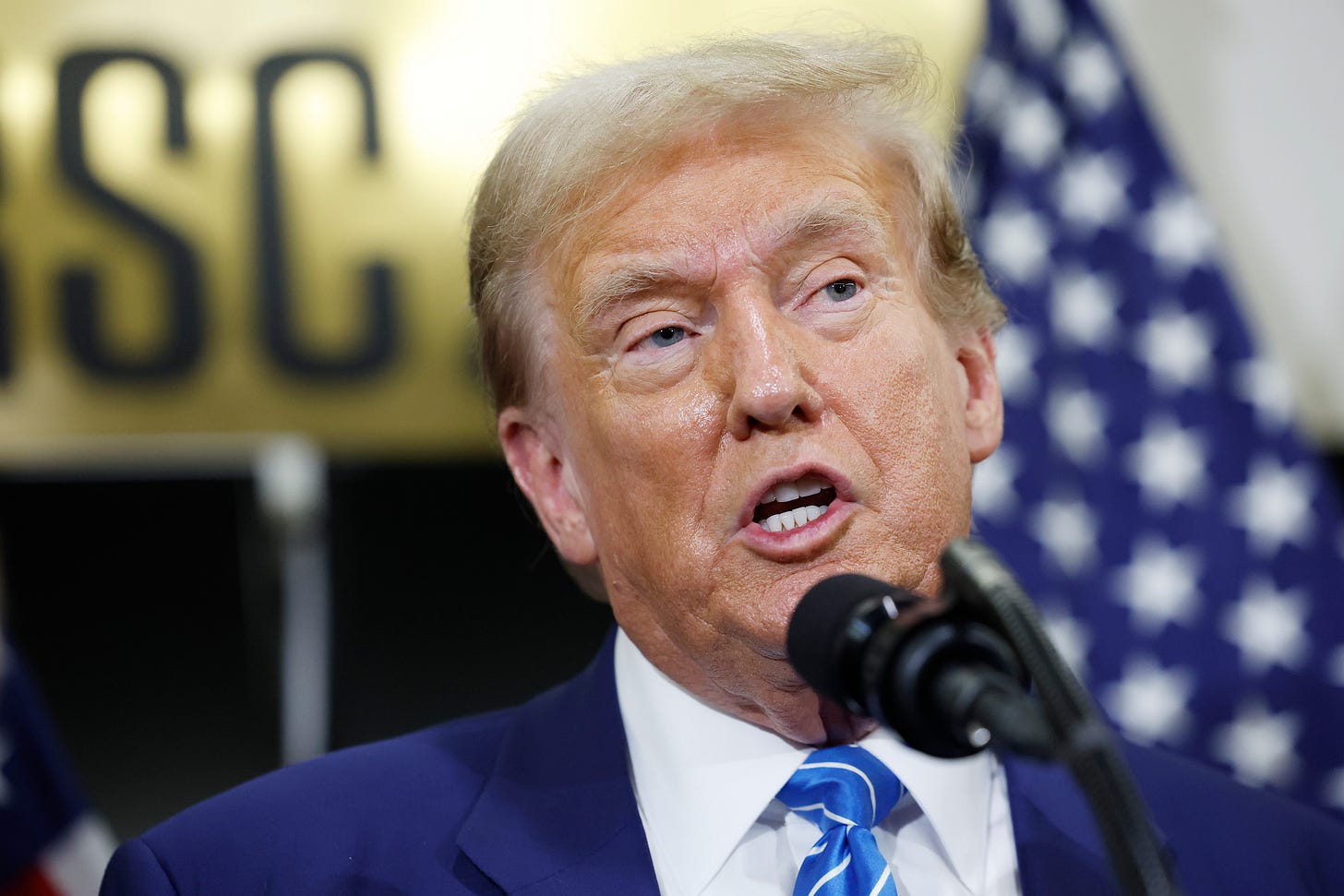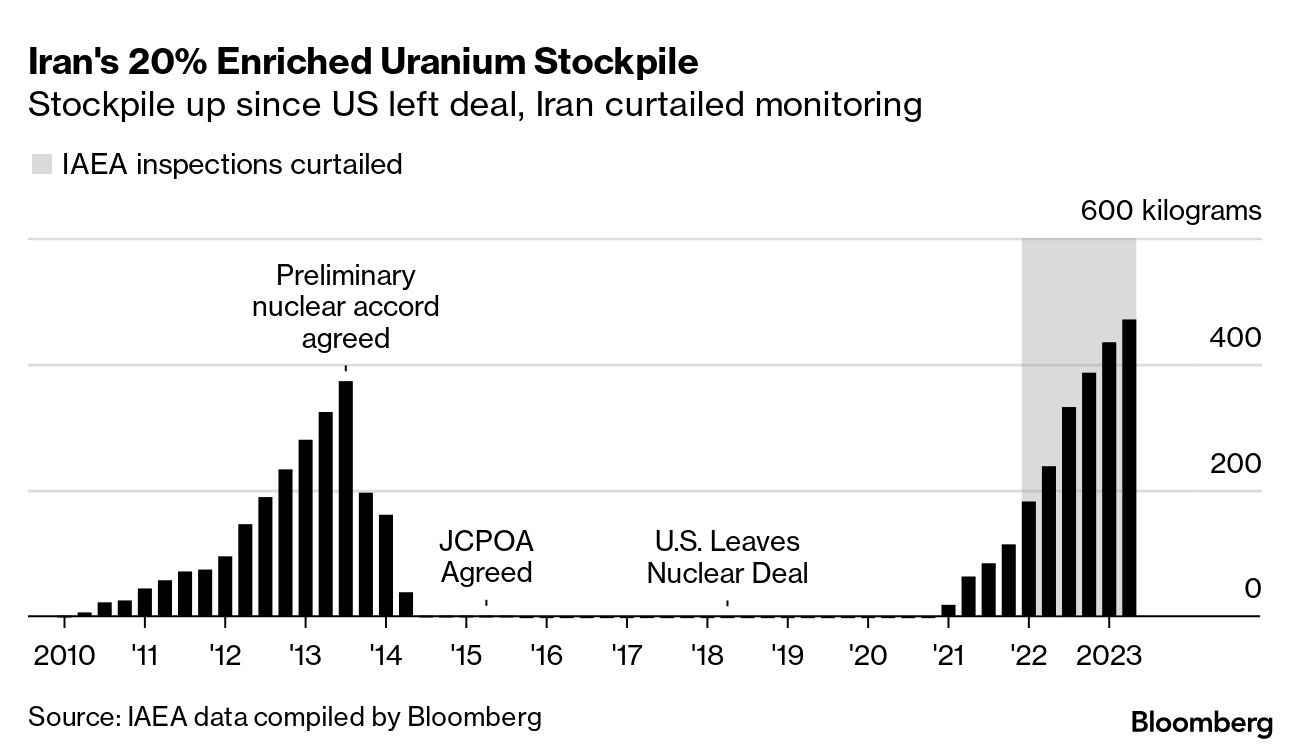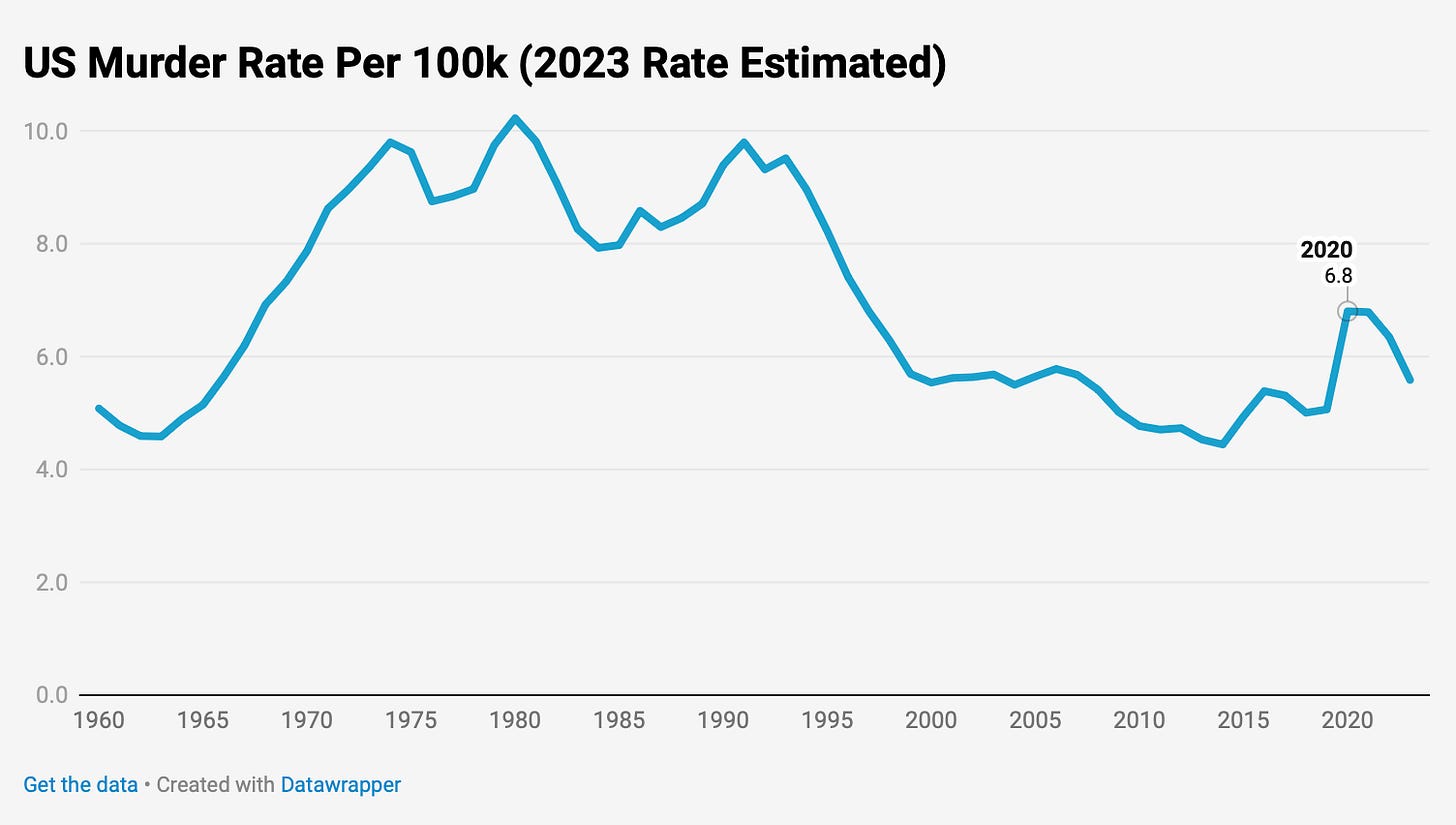Trump's presidency was a huge mess
Nostalgia for his time in office is really dumb
Last week, Donald Trump blurted out at a meeting with congressional Republicans that he favors switching to a McKinley-style system in which the American government relies on tariffs for all of its revenue. This reminded of a larger point that I think is often forgotten: When Trump was President of the United States, he did a really terrible job.
In a funny way, his tendency to muse about policy ideas that don’t make any sense and reflect a total lack of comprehension of the issues relates to one of his political strengths. Most people don’t pay that much attention to politics and have relatively low levels of policy knowledge. Swing voters, meanwhile, tend to be below-average in their level of interest in politics and policy. So Trump, by being not just ignorant but willfully disinterested, comes across as more in touch with the electorate than a typical politician.
But in most cases, you would not hire someone for a job if he had no idea what he was talking about.
You would probably worry that if you hired someone like that, he would do a bad job. And when Trump did get hired in a narrow, flukey election that saw most people vote for his opponent, he did, in fact, do a bad job. By the time he left office he was deeply unpopular because people saw — and this was before Dobbs — that he wasn’t good at it. Since then, Joe Biden has become unpopular, primarily I think because he didn’t pivot fast enough in the face of inflation. But I also think that a lot of people have forgotten what a bad job Trump did, thanks in part to a mix of delusions and deliberate myth-making, but mostly because of a strange tendency to hold him to an unusual and inconsistent standard for job performance.
On the economy, Trumpstalgics say that what matters is that the results were fine, even if the ideas espoused (like funding the entire government with tariffs) were often unsound. But on Covid, Trumpstalgics say that what matters is that he espoused the right ideas (in this case, being less cautious), even if he was completely inefficacious in delivering results. Biden gets no credit for rapid job growth, because that was just the natural unwinding of Covid-era unemployment, but he is personally to blame for every cent of inflation, which is somehow totally unrelated to that unwinding. And the unemployment itself wasn’t Trump’s fault, because it was the virus that caused the collapse of the labor market, but Trump — rather than the aforementioned collapse of the labor market — deserves credit for the temporary halt in the flow of asylum claims.
It genuinely makes no sense! And it’s worth taking a break from wrangling over whether January 6 was technically an insurrection or exactly what Trump meant when he suggested using disinfectant on people’s lungs, and zooming out to the part where he was overall bad at the job.
The myth of the Trump economy
I think an important part of this is that if you go back to the winter of 2019-2020, when everyone agreed the American economy was in pretty good shape, very few people were inclined to lavish praise on Donald Trump specifically for this.
Nearly everyone understood, at the time, that whether looking at jobs or GDP, nothing happened when Trump took over in 2017. It was just a continuation of the slow and steady recovery from the Great Recession that had been underway for seven years by the time of his inauguration. There was no thrilling turnaround. And while plenty of people who had voted for Trump because they agreed with him about immigration or guns or abortion or whatever else were excited to credit him, nobody who was skeptical of Trump thought, “Aha, he’s a genius!” It was just same old, same old.
But in fact, it’s worse than that.
The whole time that Barack Obama was president, he was asking congressional Republicans to enact additional expansionary fiscal policy to boost the economy. They kept saying no, no, no, can’t do it because we care so much about debt and deficits. And when Obama proposed a deal that combined short-term stimulus with long-term deficit reduction, they said no, no, no, we can’t do that, either. Then Trump becomes president, and Republicans turn on a dime, not only cutting taxes but agreeing to increase spending.
That’s the whole Donald Trump miracle economy. Paul Ryan and his colleagues deliberately sabotaged the recovery during Obama’s presidency, and stopped sabotaging once Trump took office. The results were totally fine (until Covid, at which point they weren’t) but there’s no evidence of any deep insights or policy efficacy that would lead you to expect strong out-of-sample performance. If we currently had a demand-constrained economy being sabotaged by Mike Johnson, that would be one thing. But it’s not the case. The best thing you can say about Trump is he didn’t wreck the status quo.
Trump set foreign policy bombs
A big concern when Trump ran in 2016 was that his ignorance and impetuousness would be destabilizing on the global stage.
And this is, in fact, what has happened. For example, Trump pulled out of the Joint Comprehensive Plan of Action that was designed to prevent Iran from developing a nuclear weapon. At the time he did this, he said that he was not trying to set the United States on a collision course for war with Iran. Instead, he was going to use a program of “maximum pressure” to force Iran back to the table to sign an unspecified “better deal.” This did not work, and no better deal emerged. During Trump’s presidency, Iran did not engage in much escalatory action, because they were hoping he wouldn’t be president forever and they could reach a deal with his successor.
Thus, Joe Biden became president and this problem was dumped in his lap. Because Trump had abrogated the JCPOA, Iran wasn’t willing to just accept the same old deal — they understandably demanded more generous terms. Because the Iranian regime is all-around pretty bad, Biden understandably was not willing to give them more generous terms, and almost certainly couldn’t have gotten such terms through Congress. Thus, Iran is now rapidly progressing toward a nuclear weapon and engaging in a range of aggressive actions throughout the Middle East.
Trump, through this quirk of timing, has secured a reputation in certain quarters as the true candidate of peace and as the true candidate of being tough on Iran, when the simple truth is he made an irresponsible policy decision and left his successor to deal with the mess.
In Afghanistan, similarly, he brought American military casualties down to zero by reaching a ceasefire deal with the Taliban that committed to the United States to withdraw all troops — after he left office. This left Biden with the no-win choice of abrogating a deal he didn’t negotiate, or rolling the dice on the stability of Afghan security forces that had supposedly been built up under his predecessor. And Trump, the ultimate blame-shifter gets to both say that the chaotic withdrawal wouldn’t have happened if he’d been president, but also that America wouldn’t be mired in an endless war. Again, though, this was just him making careless decisions and punting the consequences down the road.
Trump failed at crisis management
I’m not an idiot. I do understand, as a question of political psychology, why Joe Biden is not reaping political credit for the steep decline in the murder rate after it soared during Donald Trump’s presidency.
But I do think that rational people should try to think harder about what the job of the President of the United States is. Like Donald Trump, I enjoy tweeting a lot and doing provocative takes. But the president’s job can’t possibly be to sit in the Oval Office watching bad events unfold and then doing posts that say “hey guys, this is bad.”
If you think back to George Floyd’s death, it was a tough time for the country. A brutal crime unfolded on camera at a time when a lot of people had been cooped-up by Covid, and anti-police activists seized the moment. A handful of jurisdictions gave in to activist demands to cut police funding, but the vast majority of jurisdictions did not do that. And the vast majority of Democratic Party politicians — including some as far left as Bernie Sanders — did not hop on this particular bandwagon. Nonetheless, the protest movement that swept the country generated a broad-based decline in the intensity of police activity and a concurrent broad-based surge in violence. I think it’s really important to note that this happened all over the place, including in red states and rural areas and the handful of cities that had GOP mayors.
We had, in short, a massive failure of leadership.
This would have been a great time for an empathetic, effective president to speak from the heart to the American people about the outrageousness of what we saw on film, and also the importance of proactive policing and public safety. But that’s not Trump. He didn’t do anything to reach out and try to bring the country together, and he also didn’t do anything to try to maintain police morale or activity levels. He watched the country spiral into lawlessness and rioting, and then tweeted that it was bad that this was happening. And it was, in fact bad. Trump warned that if he lost the election, these trends would only get worse. Instead, he lost and they got better.
Far be it from me to deny you your right to cast a purely expressive anti-leftist vote for Donald Trump. But I think this again speaks to the question of his competence, judgment, and effectiveness as a leader. Stuff happened, and he did not handle it well.
I think that the same broad analysis applies to Covid. There’s a kind of knee-jerk anti-Trumpism that wants to hold him personally responsible for every American who died, and also a knee-jerk anti-anti-Trumpism that wants to say the left went crazy about this. The missing bit is an evaluation Trump’s actual job performance. Did the federal government provide people with accurate and timely information about the efficacy of face masks? About airborne transmission? Why did national parks close? The idea that America’s public sector institutions handled the situation poorly has come to be associated with pro-Trump thought. And though I get why it polarized that way, it again raises the question of what exactly this says about Trump’s job performance.
Trump appointed a lot of conservatives to stuff
In fairness to the 47 percent of Americans who voted to re-elect Trump, it’s not like his administration did nothing but flail and tweet.
A lot of what any president does is quasi-routinized appointments, and Trump did a perfectly adequate job of appointing a lot of right-wing people to various jobs. If that’s what you want out of a presidency, that’s what you want. There isn’t really much to argue about, and none of what I’m saying here applies to you. I think most highly ideological conservatives who hear about ideas like “replace the income tax with tariffs” think to themselves, “Well, that’s absurd, and because it’s absurd, we’ll talk him out of it and it won’t happen and we don’t need to worry.”
And that’s probably right. For any given terrible-but-unorthodox Trump idea, the odds of it actually happening are pretty low.
By contrast, the odds of him filling judicial vacancies with people recommended by the Federalist Society are extremely high. It’s politics in a polarized age, party ID counts for a lot, and I respect that many people are just going with the team. But I do want to emphasize that low odds does not equal zero odds, and all presidencies end up dealing with a certain amount that can’t be addressed by returning to ideological baseline. Having a president in office who has no idea what he’s talking about and is too intellectually lazy to find out poses a wide range of risks.
His defenders explain this away with an inconsistent series of arguments. We’re supposed to dismiss his erratic behavior, but the economics outcomes under Trump were fine if you give him a mulligan on Covid. But the bad outcomes of 2020 aren’t his fault, because he (erratically) opined that the meltdown of American civil society was bad. And it’s definitely true that if you judge him by outcomes rather than inputs and also make an exception for the bad outcomes, then his presidency was fine. But the inputs were, in fact, erratic and the outcomes were, in fact, bad, including several of the foreign policy problems that are troubling the country today.
Everyone makes mistakes and ideally learns from them. As best I can tell, what Trump learned from his term is that he needs to double-down on surrounding himself with craven loyalists who won’t contradict him. Not only did he tell congressional Republicans that we should replace the income tax with tariffs, but to the best of my knowledge, nobody bothered to tell him that’s a stupid idea, because at this point everyone knows that you either get on the Trump Train or do what Mitt Romney is doing and quit congress. Will governance outcomes be better or worse when nobody wants to contradict the president’s dumb ideas? It does not seem, historically, that it’s a good idea to combine an ignorant leader with a team of sycophants.






Read an article in the Times this morning profiling Black farmers in Georgia. A common complaint is that they are disappointed in promises they felt were made by Biden that never materialized. One farmer in particular holds Biden responsible for an loan forgiveness program that never happened because white farmers sued to stop it, as it was a program that was targeted at Black farmers.
Two other farmers were also featured, with one saying she doesn't see Biden as any better for Black farmers than Trump, and the other going further and saying he's just going to vote for Trump this time (while wearing a shirt quoting MLK "injustice anywhere is a threat to justice everywhere").
I feel the dynamic is based on the fact that people were in fact extremely ready for Trump to leave office as things sucked really bad, but they're holding Biden accountable for every disappointment and challenge since then, while forgetting that the source of their misery in January 2021 was in fact Trump.
Well said on Afghanistan.
It exasperates me that no one points out the obvious here: the Doha Agreement fixed the go-to-zero date for US forces at a point three months beyond the 2021 inauguration. The timeframe was already too short to allow for any real adjustment on the Afghan government's part, so it would have made hardly any logistical difference to make it a little shorter and have the withdrawal in midwinter, outside the fighting season.
The whole point, fairly obviously, was to give Trump the opportunity to reassess after the November election. If he'd won he could have torn it up and kept the force structure at Obama's levels. I doubt that would have worked, because the Taliban would have resumed attacks on US troops, but whatever went wrong in Trump's second term would have been less dramatic than a Saigon-style collapse.
When Biden won, Trump's initial impulse was to go to zero before the inauguration, to make things as chaotic as possible for his team. His military advisors talked him out of that but he still drew down to just 2500 troops, which probably wouldn't have been enough to defend Kabul alone in the face of a determined attack. At that point Saigon 2.0 was more or less inevitable, and I can't help thinking it may have been the outcome Zalmay Khalilzad (also a Republican) wanted all along.